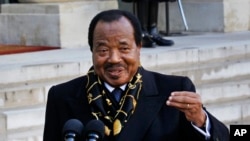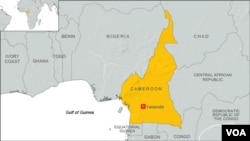Celebrations were held across Cameroon on Friday, commemorating President Paul Biya's 33 years in power. Opposition parties are calling on Biya to consider stepping down when his current term ends in 2018. But there are no signs the 82-year-old president will.
Professor Jacques Fame Ndonga, a front line supporter of the octogenarian, says Biya's backers have a moral responsibility to celebrate their leader's successes, especially for the internal peace Cameroon enjoys.
He says as they celebrate, they remember thousands who have either died or are suffering from the Boko Haram insurgency, which he says could have been terrible had Biya not declared war against the terrorists in the north of the country.
He says people should join him in counting the blessings they have enjoyed from Biya's leadership.
"It suffices to look all over the national territory and people will see the achievements of Biya. Schools, universities, health centers and hospitals, rural and urban electrification projects and drinkable water plans are some of the successes. Biya promotes development all over Cameroon without any favoritism and that the Cameroonian leader assures territorial integrity, and rights and freedom for everyone," said Ndonga.
Term limits
But Cameroon's main opposition party, the Social Democratic Front, does not have such a rosy view of the longtime leader. Senior party official Alimna Mbarga says they are using Biya's anniversary to ask him not to seek another term.
"Cameroon had seven percent economic growth in 1982 when Paul Biya became president and that the country was on a path to becoming an emerging economy like Brazil, China, Korea and Japan. But today. The economic growth rate has dropped to less than three percent. There is no democracy, no freedom of expression, falling moral standards and poor justice systems and that Paul Biya has failed," said Mbarga.
Youth leader Clarise Yimngang is skeptical Biya will heed the call not to run again. She says Biya has not helped most Cameroonians, because they remain jobless after completing their education.
“When you go to our ministries, the secretaries and people who work there were employed in the '80s. I do not want to think that the youth in this country want to go through that process any more. They go to schools with the view of getting jobs in other countries where education is valued," said Yimngang.
Political history
Biya was prime minister for seven years beginning in 1975, then became president following the resignation of the Central African state's first leader, Ahmadou Ahidjo.
In 2008, he revised the 1996 constitution to remove presidential term limits, allowing him to contest and win the 2011 election.
Biya is now serving the fourth year in his seven-year term. Asked earlier this year if he will be a candidate in 2018, Biya said "it is not he who wants, but he who can that will be able to lead Cameroon."





